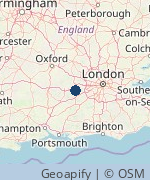The Comforting Myths of the Slave Trade
Sebastian Phillips
- Regions:
- Surrey, West Sussex, Oxfordshire, Buckinghamshire, Berkshire, London, East Sussex, Kent, Hampshire, Isle of Wight, Somerset, Wiltshire, Cambridgeshire, Norfolk, Bedfordshire
- Notice Period:
- Regular (more than one month's notice)
- Type:
- Head of a History department
- Fee:
- Expensed: At this stage - all I'm asking is travel expenses (and maybe a bottle of port)
- Category:
- History
- Updated:
- 15th July 2024
- Tagged:
- Slave Trade | Slavery | The Trade In Enslaved Peoples
The trade in enslaved peoples was horrible beyond measure. As a history teacher, I have to address this in a way that children will understand - balanced, honest and positive. But - are we still patting ourselves on the back a little too much? How has the way we've examined this topic changed over the last fifty years? And has the trade actually ended, or just changed?
This lecture is partially my own experience of studying and then teaching this topic, and partially an introduction to some excellent new resources which have become available (but not widely known) over the last decade.
Views: 684 | Enquiries: 4About Sebastian Phillips
So, a bit about me -
Until recently I was head of history at a private school. I'm now a head of RE and involved with teacher training. I frequently find that what I enjoy studying and writing about goes way beyond the needs of the classroom. GCSE and even A level is pretty limiting.
My first job after leaving university was working as a tour guide in London. I'd already got a history degree, largely based on history of crime, so it came quite naturally.
I've also led plenty of tours around Ypres and the Somme, plus giving assemblies (as one student put it - 'you do the ones that aren't boring, sir.' I'll take that. I also do 'outreach' - which is where the schools sends me to feeder schools to demonstrate that History at our establishment isn't boring.
I'm fascinated by history - especially WW1, underwater archaeology, crime and those bits of history we'd rather not talk about too loudly. Crime, Empire, the trade in enslaved peoples, etc etc. And I try to keep things topical, as far as I can.
In terms of availability - I'm happy to be flexible. If I have a projector and Internet access, and I'm available, I'm happy to give a talk. I'm even happy to combine this with a longer trip. The only issue is that as a serving teacher, I can only give talks in the evening, weekends or school holidays.
Other Talks on SpeakerNet by Sebastian Phillips
Send a message to the speaker
If you are interested in this talk and wish to contact the speaker, please complete the following form:

